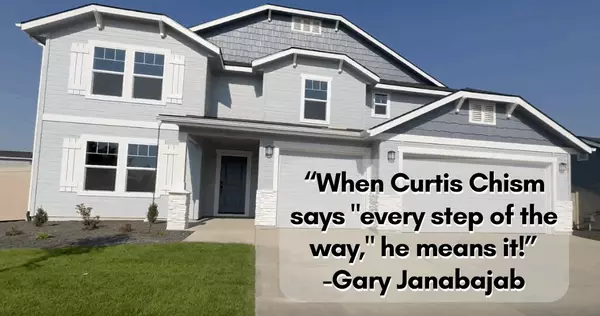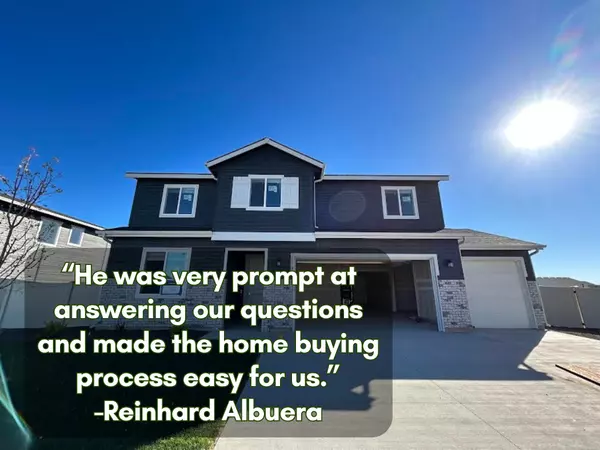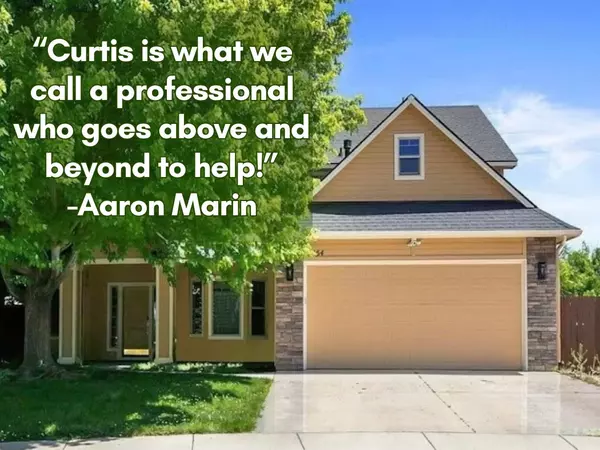Top 5 Mistakes First-Time Homebuyers Make and How to Avoid Them
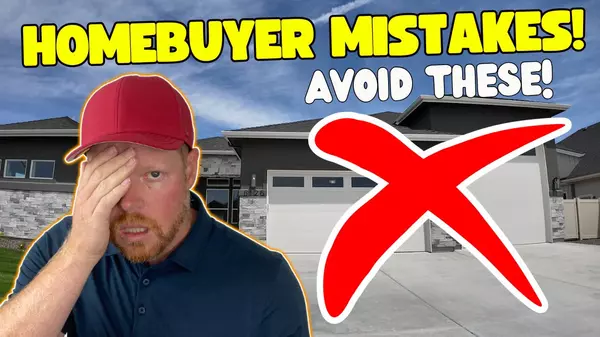
Buying your first home can be an exciting and nerve-wracking experience, all rolled into one, right? You're probably imagining yourself in that perfect home, but what if I told you that there are some common mistakes that could turn your dream home into a financial nightmare? Hey everyone, I'm Curtis Chism with EXP Realty here in Boise, Idaho, and today, I'm breaking down the top five mistakes that first-time home buyers make, and more importantly, how you can avoid them. After working with countless first-time buyers here in the Treasure Valley area, I've seen these pitfalls come up time and time again. But don't worry, by the end of this video you'll know exactly what to watch out for and how to make your home buying process smoother and more successful. So let's dive in. One of the biggest mistakes first-time home buyers make is not getting pre-approved for a mortgage before they start looking at homes. I get it, house hunting is super exciting, but here's the deal: without a pre-approval, you're flying blind when it comes to knowing what you can actually afford. Now, being pre-approved gives you two major advantages. First, it sets clear expectations on your budget, so you don't waste time looking at homes that are out of reach. Second, it makes your offer stronger when you're ready to make a bid. Sellers are more likely to take you seriously when they know that a lender has already vetted you. Now, getting pre-approved is really simple. You'll need to provide your lender with financial documents like bank statements and tax returns and proof of income. But also, pull your credit to see where you stand. But don't worry, that won't significantly impact your credit score as long as you're not applying for a whole bunch of loans over an extended period of time. Mistake number two: overlooking the hidden costs of owning a home. This is a big one that catches a lot of first-time home buyers by surprise. When you're budgeting for a home, you're probably thinking about mainly your down payment and your monthly mortgage payment. But what about all those ongoing costs that come with owning a home? Let's break it down. So you've got property taxes, homeowners insurance, and maintenance costs like repairing a roof, replacing a water heater, and don't forget about utilities. All of these add up over time. But here's something you might not realize: these hidden costs don't just pop up after you own the home. Many of them are part of your closing costs, which means you need to be ready before you even get the keys. Now, what are those closing costs? Closing costs typically include things like loan origination fees, appraisal fees, title insurance, prepaid property taxes, and homeowners insurance, and potentially some escrow fees. In Idaho, closing costs usually range around 1 to 2% of the home's purchase price. So if you're buying a $400,000 home, that could mean $4,000 to $8,000. Now, they can be higher, especially if you're using funds to buy down the mortgage rate, which is certainly an option to help lower your monthly payment. But here's the good news: if the home that you're buying doesn't have a lot of competition on it, then we can often negotiate something called a seller credit. This is where a seller covers those closing costs for you. This can help you avoid paying those costs out of pocket and essentially finance them into the loan. Now, the third mistake is skipping the home inspection. Now, this one is really crucial because your home is one of the biggest investments that you'll ever make. The last thing you want to do is move in and find out there's thousands of dollars in repairs waiting for you. Now, a good home inspection can uncover issues like roof damage, plumbing leaks, electrical problems, or even foundation cracks. These are the kinds of issues that can become massive headaches and financial drains. If you don't catch them before closing, you might be tempted to waive the inspection, especially if you think it will make your offer more attractive. But trust me, this is not where you want to cut corners; always hire a licensed home inspector. And if any red flags come up, you can either ask the seller to fix them, negotiate the price down, or get credits to account for the repairs. Number four on our list is not fully understanding your mortgage options. First-time buyers often think it's as simple as finding the lowest interest rate, but there's really a lot more to it than that. For example, you might be choosing between a fixed-rate mortgage, which locks in your interest rate for the entire loan, or an adjustable-rate mortgage, which starts lower but can get higher over time. Then there are different loan types like FHA, which might require a smaller down payment but come with mortgage insurance versus conventional loans that might require a higher credit score or down payment. The right loan for you depends on your financial situation and long-term goals. So make sure that you're working with a lender who explains the options clearly and isn't just pushing one type of loan. And finally, mistake number five is letting your emotions drive your decision. Look, buying a home is a huge milestone. It's easy to get emotionally attached to that perfect house. But when emotions take over, it can lead to costly mistakes. You might find yourself stretching your budget, ignoring problems that came up in the inspection, or getting into a bidding war that pushes the price way over your comfort zone. I always tell my clients to stick to their budget and don't compromise on major issues. Remember, there's always another house out there, and it's better to be patient than end up with a home that doesn't really fit your needs or your finances. So there you have it: those are the top five mistakes first-time home buyers make and how to avoid them. Like buying a home can feel overwhelming, but with the right preparation, you can dodge these pitfalls and make the process much smoother. If you're in the market for a home in Boise or anywhere in the Treasure Valley, I'd love to help guide you through the process and make sure that you avoid these common mistakes. Reach out to me today. Let's make your dream of home ownership a reality.
Read MoreCost of Living in Boise Idaho: Is It Really Cheaper than California?
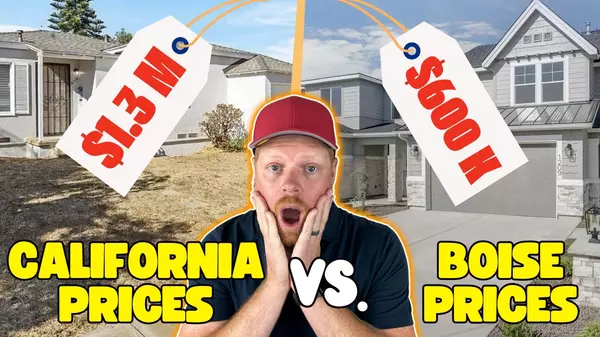
If you're thinking about moving from California to Boise, Idaho, you are not alone.Over the past few years, more and more people have been leaving California in search of a more affordable, relaxed lifestyle, and Boise is at the top of that list. But here's the big question that I hear all the time: Is Boise really that much cheaper than California? And today, in this video, I'm breaking it all down for you—from housing prices to daily expenses—so you can decide if making the move is the right choice for you. Hey, everyone, I'm Curtis Chism, a local real estate expert here in the Boise, Idaho, area, and I actually moved here from California myself. So I know exactly what you're going through, and I'm gonna help you weigh all the pros and cons about leaving the Golden State. I specialize in helping people relocate to Boise, especially those coming from California. By the end of this video, you'll have a clear picture of just how much you could save by moving to Boise and why so many people are making the jump. So let's go ahead and dive in. Let's start with the biggest difference, and for most people, it's the deal-breaker or deal-maker: the cost of housing. This is where you'll see the most dramatic savings when moving to Boise. Here in Boise, the median home price is right around $600,000, but depending on the neighborhood, you could find homes as low as $450,000 or less in areas like Nampa or Caldwell, while more popular suburbs like Meridian or Eagle might push closer to $700,000 and up. Even the most expensive homes in the Boise area, like Harris Ranch or the Highlands, are still a lot cheaper than what you're gonna find for comparable upscale areas in California. Compare that to a place like Los Angeles, where the median home price is over $1.3 million, and in areas like San Francisco, over $1.5 million. In suburban areas like San Diego County or Orange County, prices are well over a million dollars. In Boise, your dollar really does stretch a lot further. You can buy a home with more space, bigger backyards, and modern designs—all for a fraction of what you’d pay for the same type of home in California. For example, you could get a 3,000-square-foot home on a half-acre lot in Star, Idaho, for around $800,000, while in Los Angeles, that same home, if you get a half-acre, is going to be over $2 million in areas like Burbank or Pasadena. If you're looking into new construction homes, which I specialize in, you'll find even more incentives from builders, like covering your closing costs, offering lower interest rates through rate buy-downs, or including free upgrades like premium appliances or backyard landscaping. These incentives can save you thousands compared to buying a resale home or trying to build a custom home, especially in California, where construction costs are significantly higher. Builders in Boise are offering major incentives right now to compete with the resale market, and this is something I can help you navigate to get you the best deal possible. Now, not everyone is ready to buy right now, and that's totally okay. Renting could be the first thing you do when you move here to Boise; it's a great way to get a feel for the area before making a home purchase. When it comes to renting, you'll notice a big difference in prices between Boise and California. Let’s take a look at one of the most popular types of rentals: a four-bedroom single-family home in the suburbs. In Meridian, one of Boise's fastest-growing suburbs, the average rent for a four-bedroom house is currently around $2,500 to $3,000 per month, depending on the exact home size, location, and amenities. Now let's compare that to an area like San Diego, where I'm from. For a four-bedroom house in a suburban neighborhood like Poway or Chula Vista, you're looking at a monthly rent of easily $4,500 to $5,500, or even more if you’re in a highly desirable area or closer to the coast. That's a $2,000 or more difference in rent each month just for living in a similar suburban area in Boise compared to San Diego. Over the course of a year, that's a savings of $24,000 to $30,000—money you could use for other things, like saving for a down payment on a home or simply enjoying life more. There are wonderful family activities here in the Boise area. And another thing to consider: the rental market in Boise, including suburbs like Meridian, tends to be less competitive than in California's coastal cities. While demand has grown as more people move to Idaho, it's still much easier to find a well-priced rental in Boise without engaging in bidding wars or offering above the asking price, which is something many renters in California are all too familiar with. Whether you're renting while you search for the perfect home or just testing the waters before committing to a purchase here in Boise, you’ll find that renting in Boise, especially in family-friendly suburbs like Meridian, is far more affordable and less stressful than renting in Southern California. Next, let’s talk about property taxes and utilities, two things that can have a big impact on your monthly budget but are often overlooked when you're planning to move. Idaho has some of the lowest property taxes in the country, averaging around 0.7% of your home's assessed value. In contrast, California property taxes, thanks to Prop 13, are based on 1% of the purchase price, and in most areas, they’re actually closer to 1.2% or even higher due to local taxes and bond measures. So, what does that mean for your pocketbook? Let’s break it down. If you buy a home in Boise for $600,000, your property taxes would be around $4,200 a year. In California, on a $1.3 million home, typical in LA and San Diego, your property tax bill at 1.2% would be over $15,000 a year—that’s nearly four times as much. Idaho also offers a Homestead Exemption: if you live in your primary residence, you get a tax break on the first $125,000 of your home’s assessed value, significantly lowering your taxable amount. So if you're buying a home in Boise and it's your main residence, you'll be paying even less in property taxes compared to what you pay in California. Now, when it comes to utilities, Idaho is also more affordable. Let me give you a breakdown of what I personally pay for utilities in my 2,700-square-foot two-story home. On average, my electric bill is about $150 to $160. My peak electric bill was $277 in the summer, and I have a hot tub, an infrared sauna, a wine fridge, and two deep freezers. We run our AC 24/7 in the summer. In the summer, my gas bill is just $20, and in the winter, it's about $100. Now, I recently received a notice that my gas prices would be going down, which was a great surprise. When it comes to water, sewer, and trash, my bill averages about $180 every two months. Broken down to monthly, it's about $70 per month for water and sewer, about $40 for trash. For outdoor irrigation, I pay $160 a year, which is unlimited water for my outdoor landscaping needs—something incredibly affordable compared to California. Now, if you're a big gardener and enjoy having a lush yard, that's a major benefit. For my internet, my current plan costs $95 a month, but I am switching to TDS Fiber soon to lower my bills to about $35 for the base plan. Now, let's look at groceries and everyday expenses. This is another area where you'll find Boise to be more affordable. The cost of groceries in Boise is about 10 to 15% lower than in most major California cities. This might not seem like a whole lot, but when you add up the difference over the course of a year, those savings really start to stack up. For example, in Boise, a gallon of milk costs around $3, while in California, you're looking at about $5 or $6 for the same thing. A loaf of bread in Boise is about $2.50, whereas in California, it's about $4. Let's take a look at your weekly grocery bill. In Boise, for a family of four, you could spend around $150 to $200 a week, while in places like San Francisco or LA, you're looking at about $250 or more for the same groceries. Not only are groceries cheaper, but Boise has an amazing farmers' market scene where you can get fresh local produce at even lower prices. Plus, dining out is more affordable here. In Boise, you can have a great meal at a nice restaurant for about $15 to $20 per person, plus tip. While in places like San Diego or LA, you're likely looking at $30 to $50 for that same experience. Now, let's talk about transportation, which can be another major expense, especially if you're coming from a place like California, where gas prices are high and traffic is just a part of daily life. In Boise, gas prices are currently around $3.80 to $4 per gallon. In California, of course, they're much higher—you’re likely looking at between $5 to $6 per gallon. Over time, those savings at the pump really add up, especially if you have a longer commute or travel often for work. While Boise doesn't have the extreme traffic you're used to in California, traffic can be an issue at certain times and on certain roads. If you're commuting on major routes like I-84, especially coming from the suburbs into Boise, or you're hitting Eagle Road or Meridian Road during rush hour, expect congestion. A commute that could take 25 minutes without traffic might be about 40 to 45 minutes during peak hours. It's not just the highways; some of the country roads in Eagle, Star, and Nampa can get jammed up at stop signs or roundabouts, especially during rush hours or when there's construction going on. Still, even with these occasional slowdowns, commuting in Boise is generally less stressful and more predictable than in major California cities, where spending an hour or more in traffic is part of daily life. Boise's traffic might slow you down a bit, but it's usually much more manageable. If you prefer public transportation, Boise has Valley Ride, which services the Greater Treasure Valley. While it's not as extensive a public transit system as in California, many people find it more convenient to drive here. There’s plenty of free parking and shorter distances. Healthcare is another big consideration when moving from California to Idaho, especially for families. In general, healthcare costs in Idaho are lower than in California. This includes both insurance premiums and out-of-pocket expenses. For example, the average health insurance premium for a family in Idaho is around $1,000 a month, depending on your plan, while in California, premiums for similar coverage can easily exceed $1,500 to $2,000 per month. The cost of visiting a doctor, prescriptions, and even emergency room visits is typically lower in Idaho. Idaho's healthcare system, especially in Boise, is highly rated, with several top hospitals and medical providers throughout the area, like St. Luke's Health System and St. Alphonse's Health System, both of which serve the Boise area. For outdoor activities, there are many that cost you nothing. You can spend a day hiking in the Boise foothills, floating the Boise River, or mountain biking at Campbell’s Back Park, all for free. If you're a skier or snowboarder, Bogus Basin, just 16 miles from downtown Boise, offers lift tickets for around $70 to $80, compared to $150 or more in California resort areas. Boise also has a growing arts and entertainment scene with concerts, festivals, and events happening year-round. A ticket to a concert in Boise's Outlaw Field might cost you $40 to $60, while a similar show in California could easily run $100 or more. Your entertainment budget tends to go a lot further here, which means more fun without breaking the bank. For those with kids, education and childcare are always top of mind. Boise offers excellent schools and childcare options, often at a fraction of the cost compared to California. In California, full-time daycare can cost anywhere from $1,500 to $2,500 per month, whereas in Boise, those costs are generally around 20 to 30% lower, with most full-time daycare options around $1,000 to $1,500 per month. If you're thinking about schools, the Boise area has some top-rated public schools in the state, particularly in neighborhoods like Eagle and the West Ada School District. For families considering private schools, private school tuition is typically lower in Boise than in California, making it a more affordable option. Homeschooling is also popular in Boise. The city has a strong homeschooling community with many resources available for families who want a more hands-on approach to education. There are several homeschool co-ops in the area that provide social activities, group learning experiences, and extracurricular activities like sports and arts programs. Idaho's homeschooling laws are flexible, allowing parents the freedom to choose their own curriculum and teach at their own pace. One of the biggest things I hear from people moving from California to Boise is how refreshing the slower pace of life is here, though it can take some getting used to. In California, everything moves fast—the traffic, the work, the cost of living—while Boise offers a chance to slow down, with fewer financial pressures. With lower costs and less stress, many families find a better quality of life here. You can save money, enjoy the lifestyle, and have access to great amenities, activities, and entertainment options. So, is Boise really cheaper than California? In my opinion, it absolutely is. From groceries, transportation, healthcare, to entertainment, your dollar just goes a lot further here in Boise. But it's not just about the numbers; it's about the lifestyle you'll enjoy here. If you're considering moving, I'd love to help you find the perfect home and neighborhood and make your transition as smooth as possible. Whether you're looking at new construction or resale homes, I've got the expertise to help you navigate Boise's real estate market and get the best deal possible. If you're ready to explore your options or have any questions, reach out to me. You can call, text, or email me—whatever works best for you. Whether you're nine days, 90 days, or even two years out, just give me a shout. I've been in your shoes and I'm here to help you every step of the way. When you reach out, we’ll schedule a Zoom call to set a game plan to get you moved out here and make it as smooth and stress-free as possible. I look forward to helping you find your home in the beautiful Treasure Valley area. If you want to explore more about the Treasure Valley, watch this video right here where we dive in deeper, and I'll see you on the next video.
Read MoreOctober 2024 Boise Housing Market Update: What Rising Mortgage Rates Mean for Buyers and Sellers
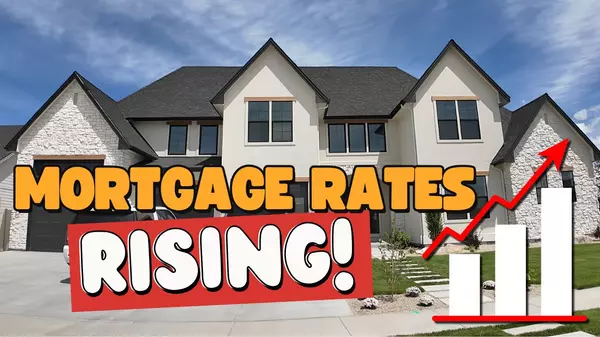
If you’re keeping an eye on the Boise housing market this fall, you’ve probably noticed something big happening—mortgage rates are spiking. This October, rates have jumped, creating a lot of buzz among homebuyers and sellers. But why is this happening, and what does it mean for the housing market in Ada and Canyon Counties? In this October 2024 Boise housing market update, we’ll break down what’s behind these rising mortgage rates, how they’re affecting home prices, and what you should do whether you’re thinking about buying or selling. Why Are Mortgage Rates Rising in October 2024? October is historically a month when mortgage rates tend to rise, and this year is no exception. Despite the Federal Reserve lowering interest rates by half a percent, mortgage rates have surged. This is largely because the bond market is reacting to increasing Federal debt levels as the government approaches year-end budget deadlines. Federal departments are rushing to spend their remaining budgets, which often creates volatility in financial markets, driving rates higher. While this rise in rates is making it more challenging for buyers, there’s hope on the horizon. Historically, mortgage rates tend to drop again in December as the market calms down, which may present an opportunity for buyers to secure a lower rate. Ada County Housing Market: October 2024 In Ada County, the housing market continues to show resilience despite rising rates. Here’s a breakdown of the key stats for September 2024: Closed Sales: 716 homes were sold, marking a 23% increase from last year. Median Sales Price: The median price in September was $534,900, up 4% year-over-year. Inventory: There are currently 1,729 homes on the market, up 10.6% compared to last year. This increase in inventory is giving buyers more options, but it also means homes are taking longer to sell. Canyon County Housing Market: October 2024 In Canyon County, the market is moving at a slower pace compared to Ada County: Closed Sales: 422 homes sold in September, reflecting a modest 3.9% increase. Median Sales Price: The median price was $423,896, a 2% year-over-year increase. Inventory: With 1,118 homes on the market, inventory is up 32%, giving buyers more leverage to negotiate. Impact of Rising Mortgage Rates on Buyers Rising mortgage rates are shrinking what many buyers can afford, especially as we head into the holiday season. This rapid rate increase means that monthly mortgage payments are higher, which limits buying power. However, if history repeats itself, we could see rates dip again in December, providing some relief for buyers willing to wait. That said, waiting comes with its own risks. Inventory typically decreases in the winter months, meaning there may be fewer homes to choose from. So, if you find a home that meets your needs now, it may be worth locking in a deal, even with the higher rates. New Construction vs. Resale Homes: Which Should You Buy? In the current market, new construction homes are offering significant advantages over resale homes. Builders are providing incentives such as mortgage rate buy-downs, closing cost coverage, and even free upgrades to attract buyers. These incentives can make new homes more appealing, especially when mortgage rates are high. Resale homes, on the other hand, are moving slower. Many sellers are overpricing their homes, which is causing them to sit on the market longer. If you’re looking at a resale home, this gives you more room to negotiate, especially if the home has been on the market for a while. Opportunities for Well-Priced Homes Despite the rising rates and increased inventory, well-priced homes in desirable neighborhoods are still selling quickly. Homes in areas like Meridian, Eagle, and Star that are priced competitively are attracting multiple offers. For buyers, this means it’s important to act quickly if you find a home that’s priced right. For sellers, it’s crucial to price your home accurately to attract serious buyers, especially as the market cools down into winter. What to Expect for the Boise Housing Market This Winter Looking ahead, we expect to see a typical seasonal slowdown as we move into November and December. Inventory is likely to drop, which could create more competition among buyers for available homes. At the same time, prices may flatten or even dip slightly as the market cools, which could benefit buyers who are patient. For sellers, this means homes may take longer to sell, and pricing will need to be competitive to attract buyers in a slower market. If you’re thinking about selling, now is the time to work with an experienced agent who understands the current market dynamics and can help you price your home effectively. Conclusion: What Should Buyers and Sellers Do Now? If you’re considering buying or selling a home in Boise or the surrounding areas, the current market conditions present both challenges and opportunities. Rising mortgage rates are making it harder for buyers, but new construction homes with incentives and well-priced resale homes are still attracting interest. Sellers need to be realistic about pricing, as overpriced homes are sitting on the market longer. The good news? You don’t have to navigate this market alone. As someone who specializes in both new construction and resale homes, I’m here to help you understand the market, whether you’re buying, selling, or just thinking about your next move. If you have any questions or want to discuss your real estate goals, feel free to reach out. I’d love to help you make the best decision in today’s ever-changing market. Curtis ChismeXp Realty(208) 510-0427curtis@chismteam.com
Read More
Categories
Recent Posts






